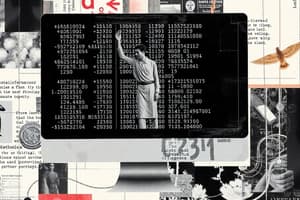Podcast
Questions and Answers
What is the primary purpose of using data analytics tools in businesses?
What is the primary purpose of using data analytics tools in businesses?
- To target potential customers more effectively
- To generate insights from customer behavior and market trends (correct)
- To develop new products and services
- To improve operational efficiency and reduce costs
How do healthcare professionals use the data they collect from patients?
How do healthcare professionals use the data they collect from patients?
- To develop new medicines and treatments
- To improve patient outcomes and satisfaction
- To make informed decisions about treatment plans
- All of the above (correct)
What is the key difference between data and information?
What is the key difference between data and information?
- Data is collected, while information is generated
- Data is always numerical, while information can be qualitative or quantitative
- Data is raw material that needs processing, while information is the result of added context and meaning (correct)
- Data is stored, while information is communicated
Which of the following is an example of data being transformed into information?
Which of the following is an example of data being transformed into information?
Why is understanding the distinction between data and information vital for anyone working with large volumes of facts or seeking to create meaningful insights?
Why is understanding the distinction between data and information vital for anyone working with large volumes of facts or seeking to create meaningful insights?
What is the primary purpose of CRM software like Trello and Asana in businesses?
What is the primary purpose of CRM software like Trello and Asana in businesses?
How do government agencies use digital signatures in their operations?
How do government agencies use digital signatures in their operations?
In the entertainment industry, what do streaming platforms like Netflix and Hulu primarily focus on?
In the entertainment industry, what do streaming platforms like Netflix and Hulu primarily focus on?
How does ICT impact education outcomes according to the text?
How does ICT impact education outcomes according to the text?
What role do automated marketing platforms like MailChimp play in businesses?
What role do automated marketing platforms like MailChimp play in businesses?
Study Notes
Data and Information
Data and information are two closely related concepts that play crucial roles in our modern world. They form the backbone of various industries like finance, healthcare, marketing, and multimedia entertainment. Understanding their differences and similarities is essential when making informed decisions.
Definition
Data
The term 'data' comes from Latin and means "given". In today's context, data refers to the raw facts and figures collected through observation, measurement, or experimentation. It can also include text, images, audio, video, and other forms of media.
Information
Data is often considered synonymous with knowledge, and it takes a qualitative leap from being just raw fact to become information when processed, analyzed, interpreted, and organized into meaningful patterns. In essence, we convert data into useful information by adding value to them, such as context, analysis, and interpretation.
Importance and Uses of Data and Information
Both data and information have significant importance across various sectors ranging from scientific research to business operations. Here are some key areas where they make a difference:
Scientific Research
In science, data collection is fundamental to understanding natural phenomena, discovering new insights, and validating theories. Scientists analyze their observations and measurements gathered over time to develop hypotheses and test predictions.
Business Operations
Business relies on data and information for effective decision-making, product development, customer targeting, and operational efficiency. Companies use data analytics tools to generate insights from their customers' behavior and market trends to improve sales strategies and customer engagement.
Healthcare Industry
Healthcare professionals collect vast amounts of data from patients' medical history, symptoms, diagnoses, and treatments. This information helps doctors make informed decisions about treatment plans, develop medicines, and improve patient outcomes.
The Relationship Between Data and Information
While both terms are related, they serve different functions in our daily lives. Data is raw material that needs processing, while information is the result of added context and meaning. For example, consider stock market prices; each number represents data for a company's current value on a given day. However, when plotted against time and analyzed with other economic indicators, this data becomes useful information for investors and analysts.
Conclusion
Understanding the distinction between data and information is vital for anyone working with large volumes of facts or seeking to create meaningful insights from them. By recognizing how these concepts relate to each other, we can better appreciate their roles in scientific discovery, business strategy, public health management, marketing campaigns, and much more.
Studying That Suits You
Use AI to generate personalized quizzes and flashcards to suit your learning preferences.
Description
Test your knowledge of the definitions, importance, and uses of data and information. Learn about the relationship between data and information in various sectors like scientific research, business operations, and healthcare. Understand how data is transformed into valuable information through analysis and interpretation.




